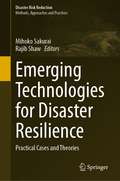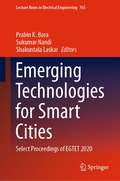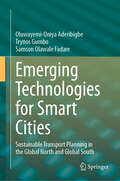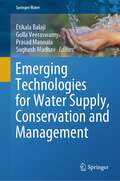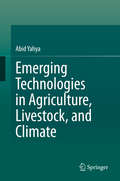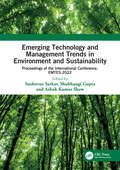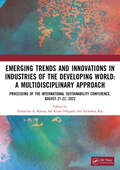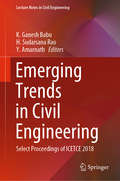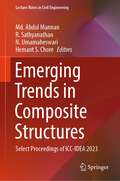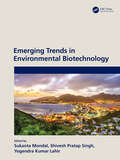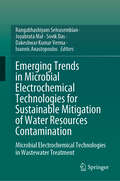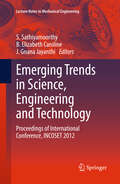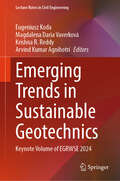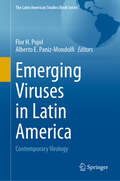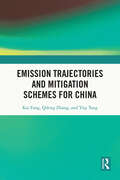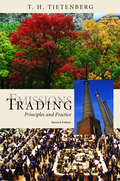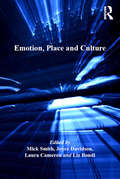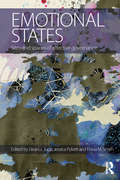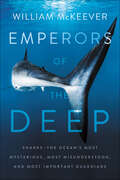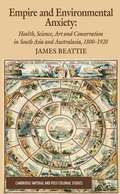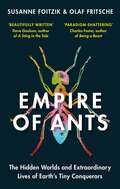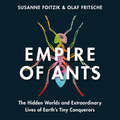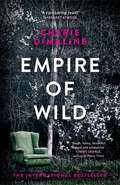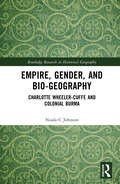- Table View
- List View
Emerging Technologies for Disaster Resilience: Practical Cases and Theories (Disaster Risk Reduction)
by Rajib Shaw Mihoko SakuraiTechnological advances have helped to enhance disaster resilience through better risk reduction, response, mitigation, rehabilitation and reconstruction. In former times, it was local and traditional knowledge that was mainly relied upon for disaster risk reduction. Much of this local knowledge is still valid in today’s world, even though possibly in different forms and contexts, and local knowledge remains a shared part of life within the communities. In contrast, with the advent of science and technology, scientists and engineers have become owners of advanced technologies, which have contributed significantly to reducing disaster risks across the globe. This book analyses emerging technologies and their effects in enhancing disaster resilience. It also evaluates the gaps, challenges, capacities required and the way forward for future disaster management. A wide variety of technologies are addressed, focusing specifically on new technologies such as cyber physical systems, geotechnology, drone, and virtual reality (VR)/ augmented reality (AR). Other sets of emerging advanced technologies including an early warning system and a decision support system are also reported on. Moreover, the book provides a variety of discussions regarding information management, communication, and community resilience at the time of a disaster. This book’s coverage of different aspects of new technologies makes it a valuable resource for students, researchers, academics, policymakers, and development practitioners.
Emerging Technologies for Smart Cities: Select Proceedings of EGTET 2020 (Lecture Notes in Electrical Engineering #765)
by Sukumar Nandi Prabin K. Bora Shakuntala LaskarThis book comprises the select proceedings of the International Conference on Emerging Global Trends in Engineering and Technology (EGTET 2020), held in Guwahati, India. The chapters in this book focus on the latest cleaner, greener, and efficient technologies being developed for the implementation of smart cities across the world. The broader topical sections include Smart Buildings, Infrastructures and Disaster Management; Smart Governance; Technologies for Smart Cities, and Wireless Connectivity for Smart Cities. This book will cater to students, researchers, industry professionals, and policy making bodies interested and involved in the planning and implementation of smart city projects.
Emerging Technologies for Smart Cities: Sustainable Transport Planning in the Global North and Global South
by Samson Olawale Fadare Trynos Gumbo Oluwayemi-Oniya AderibigbeThis book examines the use of smart city-associated technologies to enhance sustainable transportation planning in cities of both the global north and south, focusing specifically on sustainable transportation. The authors of the book examine technologies and tools such as UAVs, GIS, cutting-edge information and communication technologies, machine learning and big data to assess their potential for reducing traffic, redirecting traffic to assigned routes, monitoring traffic growth and development in our urban centres, with the ultimate aim of reducing congestion/commuting time, accidents, and pollution to promote climate action and a just transition. The book offers a comparative study of transport situation and planning in the developed and developing countries, focusing on the United States of America, Germany and Singapore in the Global North on one hand and South Africa, Nigeria and India from the Global South on the other. As more and more of the world’s population lives in urban centers, proactively monitoring and managing car traffic is essential. The book will be of interest to academics and researchers in the built environment (architecture, urban and regional planning, construction management, quantity surveying, geography), engineering, environmental sciences, social sciences, public policy, design in both the developed and developing countries.
Emerging Technologies for Water Supply, Conservation and Management (Springer Water)
by Sughosh Madhav Etikala Balaji Golla Veeraswamy Prasad MannalaThis book deals with the role of emerging technologies such as remote sensing and GIS and artificial intelligence/machine learning in water supply, conservation and management for sustainable development. These are low-cost new technologies that address current challenges dealing with large data sets, such as identifying spatial and temporal variations in water quality parameters and contaminants, groundwater potential zones and water supply and management issues. This book is helpful to show the paths of reducing the burden of time and cost and is the alternative options for the conventional practices in water supply, conservation and management. Further, the outcomings of this book are helpful for policy makers, researchers and readers.
Emerging Technologies in Agriculture, Livestock, and Climate
by Abid YahyaThis book provides applications of wireless sensor networks (WSN) in environmental monitoring, with an emphasis on livestock disease detection and agricultural management in Africa to aid farmers. This proposed system entails current and innovative monitoring technologies intended to improve agricultural conditions in Africa, with a focus on Botswana, and addresses the Internet of Things (IoT) as a set of remote monitoring protocols using WSNs to improve and ensure proper environmental maintenance. In this book, the author introduces WSNs, and how the IoT can be applied to develop a system of "smart agriculture" in Africa, taking into account livestock health, climate change impacts on crops and wildlife, and technological innovations in response to climate change such as windmills and solar panels. The book will be interesting to students and researchers in engineering and life sciences, as well as practitioners working with sensing technologies for agricultural monitoring and improvement.
Emerging Technology and Management Trends in Environment and Sustainability: Proceedings of the International Conference, EMTES-2022
by Sushovan Sarkar Shubhangi Gupta Ashok Kumar ShawThe International Conference (EMTES 2022) is oriented to include the themes like Water Quality Management, Advanced Water Treatment, Advanced Wastewater Treatment, Assessment and Control of Air Pollution, Solid and Hazardous Waste Management, Prevention of Groundwater Contamination, Wetland Management/Phyto-remediation, Case studies in Industrial Pollution Control, Liquid waste management, recent advancement in engineering, technology and management for optimization of environmental issues, application of IOT and IT in remedial measure of Environment and sustainability, Health issues and safety.
Emerging Trends and Innovations in Industries of the Developing World: A Multidisciplinary Approach
by Sai Kiran Oruganti Sudeshna Ray Dimitrios A. KarrasISC 2022 is dedicated to the Niti Aayog policies to promote sustainability through exchange of ideas emerging out of the academia. The ISC is an annual conference that is held in virtual mode until COVID restrictions on travel exist. The vision of the conference is to capacitate Academia with the necessary ideas that provide insights of the grassroot level development to various stakeholders of the Niti-Aayog policies. Towards this goal, the conference creates a conjunction of various stakeholders of Niti-Aayog policies that include- academic institutions, government bodies, policy makers and industry. The ISC organizers make concerted efforts to promote academic research that would technological, scientific, management & business practices, and insights into policy merits & disruptions. The framework of exchange of ideas is geared towards adoption of deep technologies, fundamental sciences & engineering, energy research, energy policies, advances in medicine & related case studies. This framework enables the round table discussions between the academia, industry and policy makers through its range of plenary and keynote speakers.
Emerging Trends in Civil Engineering: Select Proceedings of ICETCE 2018 (Lecture Notes in Civil Engineering #61)
by K. Ganesh Babu H. Sudarsana Rao Y. AmarnathThis book comprises select papers from the International Conference on Emerging Trends in Civil Engineering (ICETCE 2018). Latest research findings in different branches of civil engineering such as structural engineering, construction materials, geotechnical engineering, water resources engineering, environmental engineering, and transportation infrastructure are covered in this book. The book also gives an overview of emerging topics like smart materials and structures, green building technologies, and intelligent transportation system. The contents of this book will be beneficial for students, academicians, industrialists and researchers working in the field of civil engineering.
Emerging Trends in Composite Structures: Select Proceedings of ICC-IDEA 2023 (Lecture Notes in Civil Engineering #387)
by Md. Abdul Mannan R. Sathyanathan N. Umamaheswari Hemant S. ChoreThis book presents the select proceedings of International Conference on Civil Engineering: Innovative Development in Engineering Advances (ICC IDEA 2023). This book covers the latest research in the areas of structural engineering and health monitoring, steel and composite structure, bridge and tunnel engineering, earthquake engineering, disaster management, and coastal and harbor engineering. The book is useful for researchers and professionals in related fields of civil engineering.
Emerging Trends in Environmental Biotechnology
by Sukanta Mondal Shivesh Pratap Singh Yogendra Kumar LahirThe environment is an all-encompassing component of the ecosystem of "Blue planet - the earth", made up of the hydrosphere, atmosphere and lithosphere. These three spheres have biotic and abiotic components which exhibit ecological homeostasis that provides the most appropriate survival chances for the members of biotic component and geochemical balance with abiotic components. This ecosystem is subjected to relatively harsh conditions, mostly created by the disastrous activities due to natural calamities and intentional and/or accidental anthropogenic activities. Biotechnology has become a potential tool to dissipate such environmental impacts because of the advancement it has undergone recently. Emerging Trends in Environmental Biotechnology is an outstanding collection of current research that integrates basic and advanced concepts of biotechnology such as genomics, proteomics, bioinformatics, sequencing, and imaging processes to improvise and protect the environment. This book is particularly attractive for scientists, researchers, students, educators and professionals in environmental science, agriculture, veterinary and biotechnology science. The book will enable them to solve the problems about sustainable development with the help of current innovative biotechnologies such as recombinant DNA technology and genetic engineering which have tremendous potential for impacting global food security, environmental health, human and animal health and overall livelihood of mankind. Features Presents easy-to-read chapters Information is presented in a very accessible and logical format Identifies and explores biotechnological approaches for environmental protection Encompasses biodegradation of hazardous contaminants, biotechnology in waste management, nanotechnology, and issues in environmental biotechnology research
Emerging Trends in Microbial Electrochemical Technologies for Sustainable Mitigation of Water Resources Contamination: Microbial Electrochemical Technologies in Wastewater Treatment
by Joyabrata Mal Rangabhashiyam Selvasembian Dakeshwar Kumar Verma Sovik Das Ioannis AnastopoulosThe book aims to highlight the application of microbial electrochemical technologies, their fundamental to advanced, recent applications, management strategies, and relevant case studies. The book also attempts to highlight existing research and technological advancements on all facets of instruments and methods for assessing and keeping track of water contaminants. The section on current trends and advancements in this book discusses the most recent advancements in microbial electrochemical technologies and related technologies to lessen the contamination of water resources. The book goes into great detail about the fundamental aspects of water pollution, including their causes, primary sources, detection, treatment, and mitigation using microbial electrochemical technologies and management systems as well as commercialization and economics thoughts that are currently of significant importance. Additionally, with the aid of appropriate tables and figures, all of these chapters havebeen arranged according to recent developments and aspects of the field. The book's goal is to give readers a fundamental understanding of how microbial electrochemical technologies work. It is intended for a wide range of readers, including undergraduate and graduate students, researchers, academicians, environmentalists, policymakers, businesspeople, and R&D teams. We gratefully thank all of the authors. We'll be open to recommendations for making the next book or edition better.
Emerging Trends in Science, Engineering and Technology
by B. Elizabeth Caroline J Gnana Jayanthi S SathiyamoorthyThe present book is based on the research papers presented in the International Conference on Emerging Trends in Science, Engineering and Technology 2012, held at Tiruchirapalli, India. The papers presented bridges the gap between science, engineering and technology. This book covers a variety of topics, including mechanical, production, aeronautical, material science, energy, civil and environmental energy, scientific management, etc. The prime objective of the book is to fully integrate the scientific contributions from academicians, industrialists and research scholars.
Emerging Trends in Sustainable Geotechnics: Keynote Volume of EGRWSE 2024 (Lecture Notes in Civil Engineering #584)
by Krishna R. Reddy Arvind Kumar Agnihotri Eugeniusz Koda Magdalena Daria VaverkováThis volume contains peer-reviewed and selected papers presented during the International Conference on Environmental Geotechnology, Recycled Waste Materials, and Sustainable Engineering 2024, held in Warsaw, Poland. It covers the recent innovations, trends, concerns, practical challenges encountered, and the solutions adopted in waste management and engineering, geotechnical and geoenvironmental engineering, infrastructure engineering, and sustainable engineering. This book will be useful for academics, educators, policymakers, and professionals working in the field of civil engineering, chemical engineering, environmental sciences, and public policy.
Emerging Viruses in Latin America: Contemporary Virology (The Latin American Studies Book Series)
by Flor H. Pujol Alberto E. Paniz-MondolfiLatin America has extensive microbial diversity and is endemic for a wide array of infectious agents including dengue, chikungunya, malaria and tuberculosis. In 2014, the WHO cited 93 public health events of potential international concern in the Latin American region where over half (47 events) were caused specifically by chikungunya and other zoonotic pathogens, causing geographically widespread impact affecting 27 countries and territories. Arena, alpha and flaviviruses are RNA viruses, many of which are endemic in South America, are diverse in nature, and can adapt easily to new hosts, creating zoonotic threats. Since more than 70% of emerging diseases are caused by zoonotic agents, it is of great importance to enhance the capacity for detection and diagnosis in the areas where they are most likely to emerge. COVID-19 provided an opportunity to reinforce public health capacities, improve reporting transparency, and enhance regional coordination. Limited but consistent research has been carried out in the region to address the viral threats that account for a significant portion of health concerns. This book describes relevant examples of these achievements and discusses ongoing limitations in the region.
Emerging Workforce Trends in the U.S. Energy and Mining Industries: A Call to Action
by Committee on Earth ResourcesEnergy and mineral resources are essential for the nation's fundamental functions, its economy, and security. Nonfuel minerals are essential for the existence and operations of products that are used by people every day and are provided by various sectors of the mining industry. Energy in the United States is provided from a variety of resources including fossil fuels, and renewable and nuclear energy, all with established commercial industry bases. The United States is the largest electric power producer in the world. The overall value added to the U. S. gross domestic product (GDP) in 2011 by major industries that consumed processed nonfuel mineral materials was $2. 2 trillion. Recognizing the importance of understanding the state of the energy and mining workforce in the United States to assure a trained and skilled workforce of sufficient size for the future, the Department of Energy's (DOE's) National Energy technology Laboratory (NETL) contracted with the National Research Council (NRC) to perform a study of the emerging workforce trends in the U. S. energy and mining industries. Emerging Workforce Trends in the U. S. Energy and Mining Industries: A Call to Action summarizes the findings of this study.
Emission Trajectories and Mitigation Schemes for China
by Kai Fang Qifeng Zhang Yiqi TangThis book seeks to model the possible emission trajectories and identify the feasible mitigation schemes for China to meet its climate commitments to peak emissions before 2030 and net zero emissions before 2060. In line with these ambitions, China has taken a number of measures to improve carbon efficiency and energy structure in recent years. The book first analyzes changes in the carbon footprint at the city level, identify the different pathways to peak emissions by province and industry, and develop a bottom-up approach to determining when and how China could reach peak emissions. It then illustrates how the Emissions Trading Scheme (ETS) reduces abatement costs, and examines the cost-saving effects under carbon intensity reduction and peak emissions targets. Based on the findings and the status quo in China, the authors propose a multicriteria allocation scheme for carbon emission allowances at the provincial level and quantify the impact of sectoral coverage on the abatement costs of the ETS by developing a cost-based approach to sectoral coverage in China. In addition, the co-benefits between CO2 and PM2.5 reductions as a result of the ETS operation are elaborated. The book will benefit researchers and policy-makers interested in environmental governance, climate policy, environmental economics, and sustainable development.
Emissions Trading: Principles and Practice
by Thomas H. TietenbergFirst published in 1985, Emissions Trading was a comprehensive review of the first large-scale attempt to use economic incentives in environmental policy in the U.S. and of the empirical and theoretical research on which this approach is based. Since its publication it has consistently been one of the most widely cited works in the tradable permits literature. The second edition of this classic study of pollution reform considers how the use of transferable permits to control pollution has evolved, looks at how these programs have been implemented in the U.S. and internationally, and offers an objective evaluation of the resulting successes, failures, and lessons learned over the last twenty-five years.
Emotion, Place and Culture
by Liz Bondi Mick SmithRecent years have witnessed a rapid rise in engagement with emotion and affect across a broad range of disciplines in the humanities and social sciences, with geographers among others making a significant contribution by examining the emotional intersections between people and places. Building on the achievements of Emotional Geographies (2005), the editors have brought together leading scholars such as Nigel Thrift, Alphonso Lingis and Frances Dyson as well as young, up and coming academics from a diverse range of disciplines to investigate feelings and affect in various spatial and social contexts, environments and landscapes. The book is divided into five sections covering the themes of remembering, understanding, mourning, belonging, and enchanting.
Emotional States: Sites and spaces of affective governance
by Jessica Pykett Eleanor Jupp Fiona M. SmithWhat is the political allure, value and currency of emotions within contemporary cultures of governance? What does it mean to govern more humanely? Since the emergence of an emotional turn in human geography over the last decade, the notion that our emotions matter in understanding an array of social practices, spatial formations and aspects of everyday life is no longer seen as controversial. This book brings recent developments in emotional geography into dialogue with social policy concerns and contemporary issues of governance. It sets the intellectual scene for research into the geographical dimensions of the emotionalized states of the citizen, policy maker and public service worker, and highlights new research on the emotional forms of governance which now characterise public life. An international range of empirical field studies are used to examine issues of regulation, modification, governance and potential manipulation of emotional affects, professional and personal identities and political technologies. Contributors provide analysis of the role of emotional entanglements in policy strategy, policy implementation, service delivery, citizenship and participation as well as considering the emotional nature of the research process itself. It will be of interest to researchers and students within social policy, human geography, politics and related disciplines.
Emperors of the Deep: Sharks—The Ocean's Most Mysterious, Most Misunderstood, and Most Important Guardians
by William McKeeverWhat we can learn from sharks—evolutionary marvels that have survived for 450 million years, and are essential to our planet’s ecosystem.We’re conditioned to see sharks as terrifying, cold-blooded underwater predators. But as Ocean Guardian founder William McKeever reveals, we need to ensure that their remarkable longevity continues. The first book to reveal in full the hidden lives of sharks, Emperors of the Deep focuses on four species—Mako, Tiger, Hammerhead, and Great White—as never before, including such fascinating details as:Sharks are 50 million years older than treesSharks have survived five extinction level events, including the one that killed off the dinosaursSharks have electroreception, a sixth sense that lets them pick up on electric fields generated by living thingsSharks can dive 4,000 feet below the surfaceSharks account for only six human fatalities per year, while humans kill 100 million sharks per yearMcKeever goes back through time to probe the shark’s prehistoric secrets and how it has become the world’s most feared, and most misunderstood, predator, and takes us on a pulse-pounding tour around the world and deep under the surface, from the frigid waters of the Arctic Circle to the coral reefs of the tropical Central Pacific. He also interviews ecologists, conservationists, and world-renowned shark experts, including the founders of Greenpeace’s Rainbow Warrior, the head of the Massachusetts Shark Research Program, and the self-professed “last great shark hunter.”At once a deep dive into the misunderstood world of sharks and an urgent call to protect them, Emperors of the Deep celebrates this wild species that hold the key to unlocking the mysteries of the ocean—if we can prevent their extinction from climate change and human hunters.“Many astonishing facts.” —The Guardian“[An] extraordinary book [that] rarely fails to inform and delight.” —The Washington TimesIncludes photographs
Empire and Environmental Anxiety
by James BeattieA new interpretation of imperialism and environmental change, and the anxieties imperialism generated through environmental transformation and interaction with unknown landscapes. Tying together South Asia and Australasia, this book demonstrates how environmental anxieties led to increasing state resource management, conservation, and urban reform.
Empire of Ants: The hidden worlds and extraordinary lives of Earth's tiny conquerors
by Olaf Fritsche Susanne Foitzik'Beautifully written and filled with mind-boggling wonders' - Dave Goulson, author of A Sting in the Tale'Thrilling, compellingly readable and paradigm-shattering' - Charles Foster, author of Being a Beast'Both expert and entertaining' - David Barrie, author of Incredible JourneysAnts have been walking the Earth since the age of the dinosaurs. Today there are one million ants for every one of us. The closer you get to ants, the more human they look: they build megacities, grow crops, raise livestock, tend their young and infirm, and even make vaccines. They also have a darker side: they wage war, enslave rivals and rebel against their oppressors. From fearsome army ants, who stage twelve-hour hunting raids where they devour thousands, to gentle leaf-cutters gardening in their peaceful underground kingdoms, every ant is engineered by nature to fulfil their particular role.Acclaimed biologist Susanne Foitzik has travelled the globe to study these master architects of Earth. Joined by journalist Olaf Fritsche, Foitzik invites readers deep into her world - in the field and in the lab - and will inspire new respect for ants as a global superpower.Fascinating and action-packed, Empire of Ants will open your eyes to the secret societies thriving right beneath your feet.
Empire of Ants: The hidden worlds and extraordinary lives of Earth's tiny conquerors
by Olaf Fritsche Susanne FoitzikAnts have been walking the Earth since the age of the dinosaurs. Today there are one million ants for every one of us. The closer you get to ants, the more human they look: they build megacities, grow crops, raise livestock, tend their young and infirm, and even make vaccines. They also have a darker side: they wage war, enslave rivals and rebel against their oppressors. From fearsome army ants, who stage twelve-hour hunting raids where they devour thousands, to gentle leafcutters gardening in their peaceful underground kingdoms, every ant is engineered by nature to fulfil their particular role.Acclaimed biologist Susanne Foitzik has travelled the globe to study these master architects of Earth. Joined by journalist Olaf Fritsche, Foitzik invites readers deep into her world - in the field and in the lab - and will inspire new respect for ants as a global superpower.Fascinating and action-packed, Empire of Ants will open your eyes to the secret societies thriving right beneath your feet.(p) Octopus Publishing Group 2021
Empire of Wild: A Novel
by Cherie DimalineA #1 INTERNATIONAL BESTSELLEROne of the most anticipated books of the summer for Time, Harper's Bazaar, Bustle and Publishers Weekly'Deftly written, gripping and informative. Empire of Wild is a rip-roaring read!' Margaret Atwood'Empire of Wild is doing everything I love in a contemporary novel and more. It is tough, funny, beautiful, honest and propulsive' Tommy Orange, author of There There 'Dimaline turns an old story into something newly haunting and resonant' New York Times'Close, tight, stark, beautiful - rich where richness is warranted, but spare where want and sorrow have sharpened every word. Dimaline has crafted something both current and timeless' NPR'Revelatory... Gritty and engaging, this story of a woman and her missing husband is one of candor, wit and tradition'Ms. Magazine Broken-hearted Joan has been searching for her husband, Victor, for almost a year - ever since he went missing on the night they had their first serious argument. One hung-over morning in a Walmart parking lot in a little town near Georgian Bay, she is drawn to a revival tent where the local Métis have been flocking to hear a charismatic preacher. By the time she staggers into the tent the service is over, but as she is about to leave, she hears an unmistakable voice.She turns, and there is Victor. Only he insists he is not Victor, but the Reverend Eugene Wolff, on a mission to bring his people to Jesus.With only two allies - her Johnny-Cash-loving, 12-year-old nephew Zeus, and Ajean, a foul-mouthed euchre shark with deep knowledge of the old Métis ways - Joan sets out to remind the Reverend Wolff of who he really is. If he really is Victor, his life and the life of everyone she loves, depends upon her success.Inspired by traditional Métis legends, Cherie Dimaline has created a propulsive, stunning and sensuous novel.
Empire, Gender, and Bio-geography: Charlotte Wheeler-Cuffe and Colonial Burma (Routledge Research in Historical Geography)
by Nuala C JohnsonThis book explores the relationships between empire, natural history, and gender in the production of geographical knowledge and its translation between colonial Burma and Britain. Focusing on the work of the plant collector, botanical illustrator, and naturalist, Charlotte Wheeler-Cuffe, this book illustrates how natural history was practised and produced by a woman working in the tropics from 1897 to 1921. Drawing on the extensive and under-studied archive of private and official correspondence, diaries, sketchbooks, photographs, paintings, and plant lists of Wheeler-Cuffe, this book advances our conceptual understanding of the 'invisible’ historical geographies underpinning scientific knowledge production, by focusing on the role of a female actor in the complex gendered setting of colonial Burma. Using a bio-geographical approach, this analysis reconceptualises female agency beyond authorship and publication, and stresses how Wheeler-Cuffe represents an instantiation of the occluded contribution of women to the historiography of natural history. This book highlights Wheeler-Cuffe’s production of scientific knowledge about Burma in the context of her relationship, as a white Western woman, with local, indigenous actors and details her practice of fieldwork and its embodied geographies in different parts of Burma, while she maintained the domestic superstructure of a colonial wife. This book will be of interest to advance-level students and researchers in historical and cultural geography; the history of science; feminist geography; women and natural history; colonial Burma and imperialism; and botanical art and illustration.
